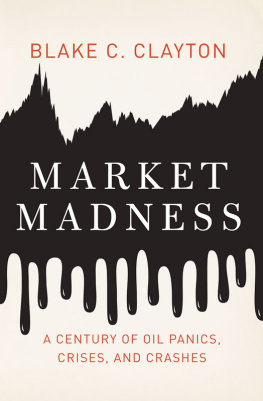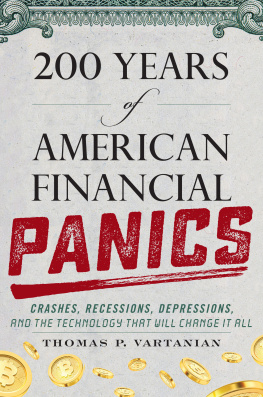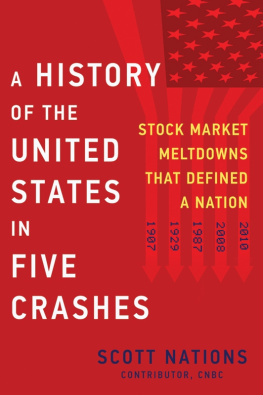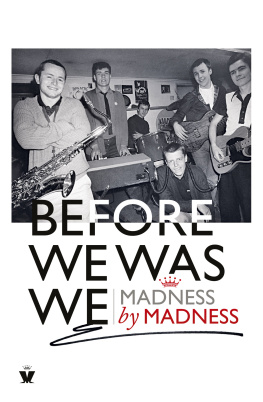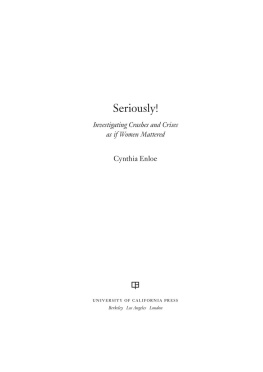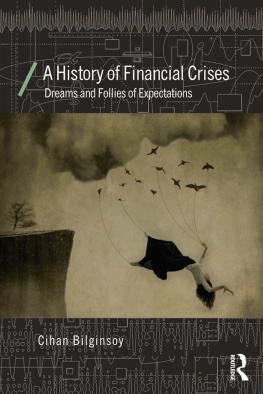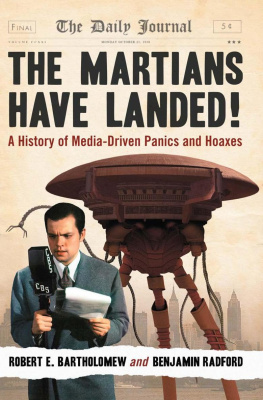Blake C. Clayton - Market Madness: A Century of Oil Panics, Crises, and Crashes
Here you can read online Blake C. Clayton - Market Madness: A Century of Oil Panics, Crises, and Crashes full text of the book (entire story) in english for free. Download pdf and epub, get meaning, cover and reviews about this ebook. year: 2015, publisher: OUP USA, genre: Politics. Description of the work, (preface) as well as reviews are available. Best literature library LitArk.com created for fans of good reading and offers a wide selection of genres:
Romance novel
Science fiction
Adventure
Detective
Science
History
Home and family
Prose
Art
Politics
Computer
Non-fiction
Religion
Business
Children
Humor
Choose a favorite category and find really read worthwhile books. Enjoy immersion in the world of imagination, feel the emotions of the characters or learn something new for yourself, make an fascinating discovery.
- Book:Market Madness: A Century of Oil Panics, Crises, and Crashes
- Author:
- Publisher:OUP USA
- Genre:
- Year:2015
- Rating:3 / 5
- Favourites:Add to favourites
- Your mark:
- 60
- 1
- 2
- 3
- 4
- 5
Market Madness: A Century of Oil Panics, Crises, and Crashes: summary, description and annotation
We offer to read an annotation, description, summary or preface (depends on what the author of the book "Market Madness: A Century of Oil Panics, Crises, and Crashes" wrote himself). If you haven't found the necessary information about the book — write in the comments, we will try to find it.
Market Madness: A Century of Oil Panics, Crises, and Crashes — read online for free the complete book (whole text) full work
Below is the text of the book, divided by pages. System saving the place of the last page read, allows you to conveniently read the book "Market Madness: A Century of Oil Panics, Crises, and Crashes" online for free, without having to search again every time where you left off. Put a bookmark, and you can go to the page where you finished reading at any time.
Font size:
Interval:
Bookmark:

Market Madness
The Council on Foreign Relations (CFR) is an independent, nonpartisan membership organization, think tank, and publisher dedicated to being a resource for its members, government officials, business executives, journalists, educators and students, civic and religious leaders, and other interested citizens in order to help them better understand the world and the foreign policy choices facing the United States and other countries. Founded in 1921, CFR carries out its mission by maintaining a diverse membership, with special programs to promote interest and develop expertise in the next generation of foreign policy leaders; convening meetings at its headquarters in New York and in Washington, DC, and other cities where senior government officials, members of Congress, global leaders, and prominent thinkers come together with CFR members to discuss and debate major international issues; supporting a Studies Program that fosters independent research, enabling CFR scholars to produce articles, reports, and books and hold roundtables that analyze foreign policy issues and make concrete policy recommendations; publishing Foreign Affairs, the preeminent journal on international affairs and U.S. foreign policy; sponsoring Independent Task Forces that produce reports with both findings and policy prescriptions on the most important foreign policy topics; and providing up-to-date information and analysis about world events and American foreign policy on its website, http://www.cfr.org.
The Council on Foreign Relations takes no institutional positions on policy issues and has no affiliation with the U.S. government. All views expressed in its publications and on its website are the sole responsibility of the author or authors.

Oxford University Press is a department of the University of Oxford. It furthers the Universitys objective of excellence in research, scholarship, and education by publishing worldwide.
Oxford New York
Auckland Cape Town Dar es Salaam Hong Kong Karachi Kuala Lumpur Madrid Melbourne Mexico City Nairobi New Delhi Shanghai Taipei Toronto
With offices in
Argentina Austria Brazil Chile Czech Republic France Greece Guatemala Hungary Italy Japan Poland Portugal Singapore South Korea Switzerland Thailand Turkey Ukraine Vietnam
Oxford is a registered trade mark of Oxford University Press in the UK and certain other countries.
Published in the United States of America by
Oxford University Press
198 Madison Avenue, New York, NY 10016
Blake C. Clayton, 2015
All rights reserved. No part of this publication may be reproduced, stored in a retrieval system, or transmitted, in any form or by any means, without the prior permission in writing of Oxford University Press, or as expressly permitted by law, by license, or under terms agreed with the appropriate reproduction rights organization. Inquiries concerning reproduction outside the scope of the above should be sent to the Rights Department, Oxford University Press, at the address above.
You must not circulate this work in any other form and you must impose this same condition on any acquirer.
Library of Congress Cataloging-in-Publication Data
Clayton, Blake C. (Blake Carman), 1982
Market madness : a century of oil panics, crises, and crashes / Blake C. Clayton.
p.cm.
Includes bibliographical references and index.
ISBN 9780199990054 (hardback)
ISBN 9780199990078 (ebook)
1. Petroleum industry and tradeUnited StatesHistory. 2. Petroleum reservesUnited StatesHistory. 3. Energy consumptionUnited StatesHistory. 4. Energy policyUnited StatesHistory.I. Title.
HD9560.5.C5675 2015
338.272820973dc23
2014024750
135798642
Printed in the United States of America on acid-free paper
This book is about what you might call the flip side of irrational exuberanceirrational anxiety might be the right term, or perhaps irrational pessimism. Like irrational exuberance, the phrase that Federal Reserve Chairman Alan Greenspan famously employed in 1996 to describe an overheated American stock market, irrational anxiety also refers to a certain kind of popular fervor that can accompany a bull marketbut for oil, not stocks.
Unlike the stock market, where rising prices are associated with rosy visions of economic growth, boom times in the oil market often feature a growing chorus of frightening predictions that the end of oil is nigh. The mood is apocalyptic, not optimistic. The world is running out of oil, some alarmists cry. The planet can pump no more; oil production is doomed by geology to shrink from here on out, leading prices to rise as far as the eye can see as the commodity becomes more and more expensive to extract. In the oil market, unlike most other markets, this unflinching pessimism, coupled with a forecast that demand for the stuff will grow quickly, is the ultimate bull market argument. Anxiety about the future of oil becomes the ultimate reason to buy, and thus the ultimate boom-time story. But it has always proven wrong. True, oil prices can rise for stretches of time. Yet oil production globally has never hit the wall the Cassandras swear is right around the corner, nor has a bull market for oil ever not given way to bear.
This book tells the story of episodes of widespread fear in the United States about an imminent, irreversible collapse in oil production, which some prominent voices feared would cause oil prices to rise for a prolonged period and perhaps indefinitely, or at least until oil demand declined. These fears were not always irrational in a pure, academic sense. They were often the product of limited information about the worlds oil reserves, which ultimately proved far too conservative, as well as a lack of appreciation for the ability of market forces and technological advancement to change the dynamics of reserve calculations. That said, history points to a persistent bias among analysts to extrapolate todays price trajectory too far into the future, interpret rising prices as evidence of oil running out for good, and discount too highly the likelihood of high prices to stimulate additional oil production over time.
The purported end of oil has been a hallmark of popular debate about energy over the last decade. In 2008, as oil prices raced past $100 per barrel, anyone who turned on CNBC, picked up a newspaper, or skimmed a blog about the future of energy would have almost certainly been introduced to the idea that the worlds oil supplies were simply giving out, coupled perhaps with the recommendation to buy oil until that far-distant day when, if we were lucky, mankind might develop enough alternative energy sources to spare prices moving higher and higher each year. Such predictions, which had been making headlines over the half decade prior, looked downright prophetic when oil eventually hit a once unthinkable peak of nearly $150 per barrel in the summer of 2008. Public opinion polls showed that most Americans believed that the world was indeed running out of oil. Ever-rising prices for gasoline on street corners around the country seemed to corroborate that view, as did countless documentaries, books, articles, and websites with terrifying titles like Out of Gas: The End of the Age of Oil (2004), The Final Energy Crisis (2005), A Thousand Barrels a Second: The Coming Oil Break Point (2006), PetroApocolypse Now? (2008), and the most aggressive forecast of all, $20 Per Gallon: How the Rising Cost of Gasoline will Radically Change our Lives
Next pageFont size:
Interval:
Bookmark:
Similar books «Market Madness: A Century of Oil Panics, Crises, and Crashes»
Look at similar books to Market Madness: A Century of Oil Panics, Crises, and Crashes. We have selected literature similar in name and meaning in the hope of providing readers with more options to find new, interesting, not yet read works.
Discussion, reviews of the book Market Madness: A Century of Oil Panics, Crises, and Crashes and just readers' own opinions. Leave your comments, write what you think about the work, its meaning or the main characters. Specify what exactly you liked and what you didn't like, and why you think so.

